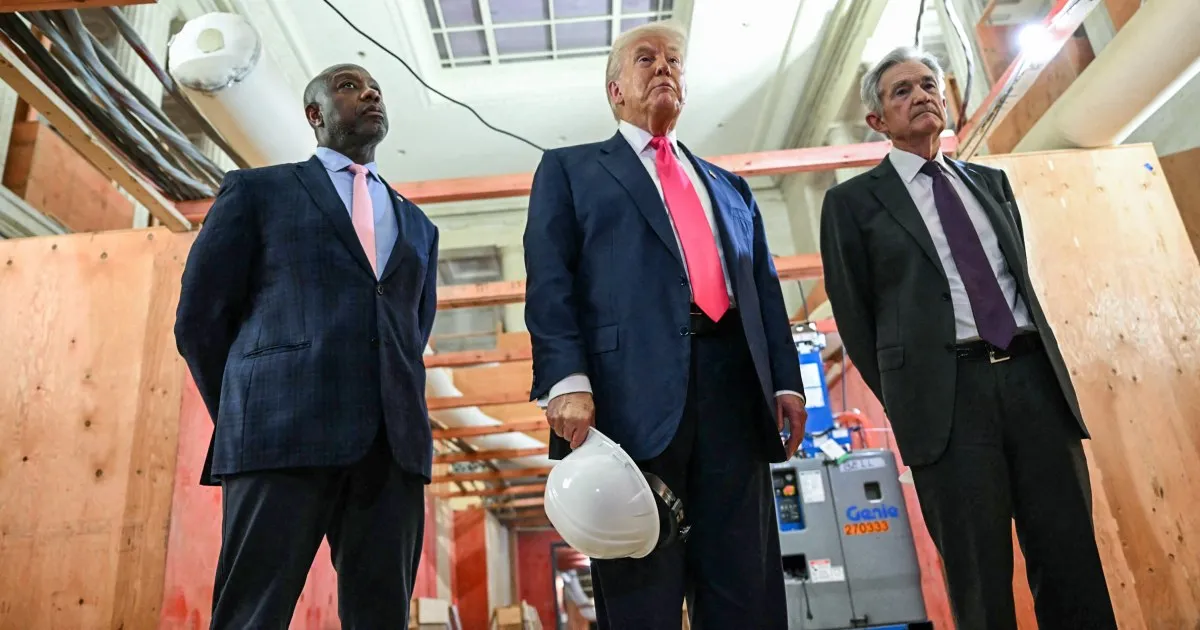
The Federal Reserve has maintained its stance against the aggressive pressure campaign led by President Donald Trump to disregard inflation concerns and lower interest rates to stimulate the U.S. economy. As the central bank enters a two-day meeting, it is widely anticipated that interest rates will remain unchanged, a decision likely to frustrate Trump, who is already influencing the global economy through his tariffs.
Financial analysts and market projections indicate that the Federal Reserve will not cut its key rate during this meeting. Analysts from Nomura noted in a recent report, “We expect Chair Powell to reiterate his view that the Fed can afford to remain on hold to assess the tariff impact as long as the U.S. economy and labor market remain strong.” Recent data has shown early signs of tariff-induced price pressures, while growth indicators suggest the economy remains robust.
The central bank is tasked with balancing inflation and unemployment through its influential interest rates. Currently, the U.S. economy is in solid condition, with an unemployment rate of 4.1%. However, the median duration for unemployed individuals to find work has increased to over 10 weeks. Additionally, stock markets have reached all-time highs, fueled by optimism regarding the transformative potential of artificial intelligence on corporate profitability.
Inflation remains the biggest wild card in the economic landscape. For the first five months of Trump’s second term, inflation remained relatively low. However, June marked the beginning of noticeable price increases, attributed to tariffs impacting costs for goods such as apparel, appliances, and toys. Economic forecasts suggest that tariffs will likely continue pushing consumer prices higher, complicating the Federal Reserve’s decision-making process.
In an ironic twist, Jerome Powell, the Fed Chair, indicated that the central bank might have already considered a rate cut were it not for Trump’s extensive and unpredictable tariff policies. Trump's increasing pressure on Powell has raised concerns about the independence of the Federal Reserve and the potential for political interference.
The Federal Open Market Committee (FOMC) is responsible for setting the Fed's key rate. While Powell heads this committee, it includes 11 other members, including two appointed by Trump during his first term—Michelle Bowman and Christopher Waller. Both have advocated for lower rates, arguing that inflation pressures are manageable and that the job market shows signs of weakening. The committee convenes eight times a year to determine monetary policy, including decisions regarding rate adjustments.
Experts predict that Bowman and Waller may dissent from the expected decision to maintain current rates. Notably, the FOMC has not seen more than one dissenting vote in over thirty years, highlighting ongoing economic uncertainty and the potential influence of political considerations on their discussions.
If the Fed opts not to lower rates this month, a reduction could still occur before the year ends, with market predictions suggesting over a 60% chance of a cut in September. It’s essential to note that a reduction in the Fed's key rate may not translate directly into lower borrowing costs for mortgages, cars, or credit cards. The Fed targets short-term interest rates, which do not immediately affect long-term borrowing costs.
Mortgage rates, for example, are influenced by various factors, including the yield on 10-year Treasury bonds. Since the onset of the COVID-19 pandemic, rates have risen to approximately 4.5%, contributing to a mortgage rate of around 6.5%. Inflation expectations significantly drive interest rates; if investors foresee rising prices, they demand higher rates in compensation.
The Federal Reserve believes inflation expectations are currently stable, although Trump’s tariffs have created a level of uncertainty that could disrupt this balance. Maintaining the key rate within a range of 4.25% to 4.5% has helped keep inflation in check by controlling overall demand in the economy.
If Powell were to be dismissed, analysts warn that inflation expectations could become “unanchored,” leading to faster inflation and consequently higher interest rates. This scenario would also impact borrowing costs for the federal government, as any significant investor uncertainty regarding the U.S. economy could prompt increased Treasury yields, thus raising mortgage rates.
Concerns about potential volatility in the stock market have already surfaced, with speculation regarding Powell's job intensifying earlier this month. Analysts from Capital Economics summarize the situation, stating, “Long story short, it’s not a pretty picture,” indicating that Trump's attempts to remove Powell could have severe repercussions for the economy.